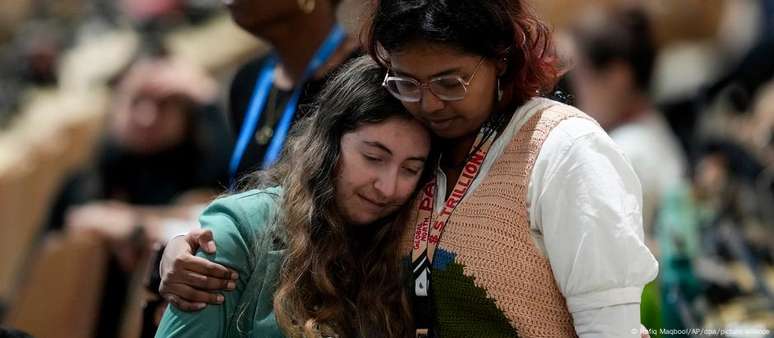The Azerbaijani command was criticized in the edition of the Climate Conference which ends with little money leaving from rich countries for poor countries affected by climate change. Shortly before three o’clock on Sunday morning (24/11), the hammer announced the end of the Baku Climate Conference (COP29), in Azerbaijan. A weary audience applauded the final document announced by Mukhtar Babayev, the country’s minister who has had a troubled presidency leading the negotiations.
The applause didn’t exactly mean a celebration of the result. The session, which began at 8pm and with repeated interruptions, adopted an agreement in which developed countries commit to making $300 billion a year available until 2035 for the poorest to address climate change. The minimum required, according to estimates, is 1.3 trillion dollars per year.
Hours earlier, Minister Marina Silva, head of the Brazilian delegation, had declared that, given the impasse, an acceptable figure at this stage would be $300 billion, recommending that the sum reach the one trillion threshold as soon as possible.
The representative of Vanuatu, a Pacific island, expressed disbelief and said the dollars promised to Baku were not enough. “Based on our experience with such promises in the past, we know they will not be kept,” said envoy Ralph Regenvanu.
Due to climate change, Vanuatu is going underwater due to rising sea levels. The nation is part of the Alliance of Small Island Countries (Aosis), whose president left the negotiating room during the final hours of COP29 in opposition to the line adopted by the document.
“Default”
The Baku edition had all the elements of the last COPs: delays in negotiations, extensions, strong reactions to proposals considered weak – as well as expensive food and very expensive hotel rates in very poor conditions.
Civil society followed the debate to the end and protested. Claudio Angelo, director of international policy at the Climate Observatory, considers the agreement a “disaster”, which failed to define important issues such as the deadline for the abolition of fossil fuels, the biggest villains of the climate crisis.
“The rich countries have once again shirked responsibility, they have laid down the law. This could worsen the situation of developing countries, which are left without fair climate financing already in debt. This is a default of the rich countries “, Angelo told DW.
Money is tight and the time allowed for the value to increase (2035) is too long, says Liane Schalatek of the Heinrich-Böll-Stiftung in an interview with DW. “The Paris Agreement says that developed countries should provide the poorest with enough money, including public resources, so that they are able to reduce their emissions. That’s not what’s happening,” he argues.
“These have been the most horrendous climate negotiations in years due to the bad faith of developed countries,” criticized Tasneem Essop, executive director of the Climate Action Network. The NGO network rates the presidency’s performance as “horrific” and says rich nations “betrayed” poorer ones.
The definition in the climate finance document, called the New Quantified Collective Target (NCQG), has attracted criticism. According to the Climate Observatory, the text does not determine the share of public funding, which could lead to a dilution of sources and responsibilities. Another fear is that some of this financing occurs through lending mechanisms, which presents an obstacle for those who are poorer and more indebted.
Disappointing geopolitics
The document arrives in a difficult political context. The election of Donald Trump, a denier at the head of the historically largest country for greenhouse gas emissions, has shaken minds. The expectation is that he will withdraw the United States from the Paris Agreement again as soon as he takes office in January.
Even when it took him three years to withdraw the country from the deal, emissions increased in three of his four years in office. He also says he will allow all oil and natural gas exploration applications and reduce subsidies for ‘energy If this happened, its emissions would increase significantly,’ comments Carlos Nobre, a Brazilian climate scientist, at COP29.
According to Nobre, for 17 months the planet’s average temperature has been 1.5°C higher than the pre-industrial era. “Extreme climate events have never been this extreme. Wow, we in climate science have been saying this could happen for decades. Actions are very slow,” he adds.
As the lights went out under Joe Biden’s government, the American delegation struggled to appear collaborative. Less outspoken than usual, the team was reluctant to discuss the NCQG’s values precisely because it could not guarantee that the money would arrive under the Trump administration.
From Baku to Bethlehem
For the head of the United Nations Framework Convention on Climate Change (UNFCCC), countries leave Baku with a mountain of work to do. “The many other issues we need to make progress on may not make the headlines, but they mean life or death for billions of people. So now is not the time to celebrate victory, we need to set our goals and redouble our efforts along the way. in Bethlehem,” said Simon Stiell, referring to the next COP, which will be held in Brazil.
During the days of the conference, the delegations said they looked forward to the next edition of the COP, in Belém, under the presidency of Brazil. After three years of editions in countries with authoritarian governments, it will be up to a democratic regime to host the negotiations again. Unlike Baku, Dubai and Sharm el-Sheikh, civil society should have no restrictions on protesting against climate criminals from outside and within national borders.
“The path to Belém will be difficult, but we have faith in the Brazilian leadership to achieve a result that contributes to global climate justice,” assesses Raíssa Ferreira, of Greenpeace Brazil, after the end of COP29.
Source: Terra
Rose James is a Gossipify movie and series reviewer known for her in-depth analysis and unique perspective on the latest releases. With a background in film studies, she provides engaging and informative reviews, and keeps readers up to date with industry trends and emerging talents.






